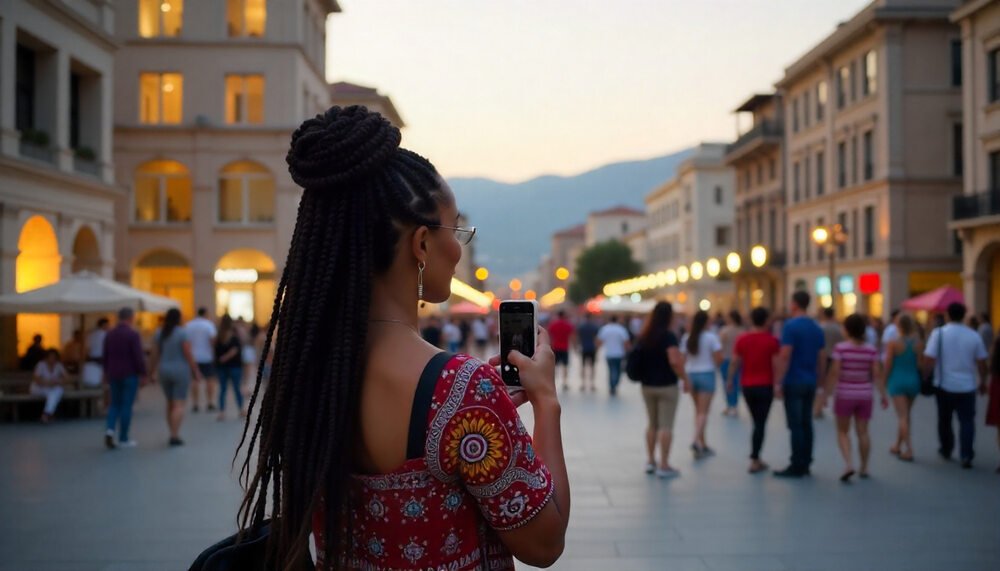Hotels & Accommodations
Albania Tourism Sees Dynamic Changes with Hotel Prices Shaping Up for Budget-Conscious Travelers in 2025

Published on
August 10, 2025 |
Albania’s tourism sector has observed a modest uptick in foreign visitors during the first half of 2025, yet this increase is not reflected in coastal destinations.
Tourism in Albania is evolving as visitor preferences change. While foreign arrivals rise, hotel prices are adjusting to attract more budget-conscious travelers seeking experiences beyond beach vacations.
Albania’s tourism sector has observed a modest uptick in foreign visitors during the first half of 2025, yet this increase is not reflected in coastal destinations. Local hotel operators and tour providers have noted that the type of tourist visiting Albania has shifted significantly. Today’s visitors are less interested in spending extended days on the beach, instead preferring to explore more diverse aspects of the country at affordable prices.
Evolving Tourist Preferences
By July, a clearer picture of the summer season emerged. Despite being peak holiday time, the number of visitors during weekdays was low, with only weekends seeing an influx of tourists. This trend forced hotels to adjust their pricing strategies, with many cutting rates by as much as 10-25% to remain competitive.
Regions like Saranda, Ksamil, and Himara, which traditionally see high demand during the summer, have responded to this shift by reducing their prices. The main driver behind these changes is the shift in the tourist profile: travelers are increasingly seeking experiences beyond the traditional beach vacation. These visitors are focused on exploring Albania’s natural beauty, history, and culture, often with an eye on keeping costs low.
Ksamil: A Family Destination with Increased Affordability
Ksamil, a favorite for families, has seen a notable change in affordability this year. Previously, high prices had limited the duration of many families’ stays. However, the recent drop in hotel rates has made it easier for families to enjoy longer vacations. Travelers are finding that apartment rentals and hotels, once expensive, are now offering much better value.
As a result, many tourists are now opting for a longer stay at lower prices, even in high-demand months like August. For instance, a three-star hotel room in Ksamil can be found for as little as 550 euros for a week in early August—an attractive offer for budget-conscious travelers.
The Surge of New Accommodation and Rentals
Another major influence on Albania’s tourism pricing is the influx of new hotels and short-term rental properties. The growing competition from these new accommodations has forced established properties to reconsider their pricing strategies to remain competitive. Additionally, the availability of budget-friendly options has made Albania a more appealing destination for travelers looking for affordability.
Moreover, the shift in visitor demographics, especially from Kosovo, has contributed to this change. Many Kosovo tourists, traditionally loyal to Albania’s southern beaches, have been exploring other destinations due to factors such as the depreciation of the Euro and visa liberalization.
Durrës and Golemi: Value for Money Continues
While the prices in many coastal regions have fluctuated, Durrës and Golemi have maintained their reputation for offering great value. Durrës continues to attract both local and international tourists, thanks to its blend of affordable pricing and diverse accommodation options. The region also benefits from organized tourism, which provides a steady flow of visitors.
Golemi has similarly remained a top choice for budget travelers seeking a more economical beach vacation, continuing to offer beautiful landscapes and a lower price point than the more expensive southern regions.
Northern Albania: Shëngjin and Velipoja’s Transformation
In northern Albania, areas like Shëngjin and Velipoja are evolving as well. Once considered affordable, these areas have begun to attract more upscale tourists. Investments in new and improved accommodation facilities have led to an increase in prices for higher-end properties. However, budget-friendly options remain, particularly for those from Albania and Kosovo looking for more economical choices.
Despite the rise in premium offerings, these northern coastal regions remain popular for tourists seeking both scenic beauty and value for money. For example, Velipoja still offers standard double rooms at prices starting from 40 euros per night, although higher-end rooms have seen a slight price increase of around 5%.
Borsh and Qeparo: Price Increases Due to Demand
Southern Albanian destinations such as Borsh and Qeparo have experienced a surge in demand, resulting in rising prices. Once known for their affordability, these areas have gained popularity, especially among families looking for a quieter and less crowded vacation experience. As a result, prices in Borsh have risen by 8% compared to last year, reflecting this increased interest.
Qeparo has seen a more significant rise in prices, with rates increasing by up to 25% due to high demand and the limited availability of accommodation. While these areas remain relatively inexpensive compared to more well-known destinations like Saranda, the demand has naturally driven up prices.
The Road Ahead for Albanian Tourism
As Albania’s tourism industry adapts to changing visitor preferences, the focus has shifted from traditional beach vacations to more varied and immersive travel experiences. The influx of new accommodation options, combined with the evolving tourist profile, has reshaped the market, leading to significant price adjustments along the coast.
For travelers seeking a rich cultural experience at an affordable price, Albania remains an attractive destination. The country’s natural beauty, historic sites, and lower accommodation costs present an opportunity for visitors to explore a variety of landscapes and activities while maintaining a budget-friendly itinerary. As these trends continue to unfold, Albania’s tourism sector is poised to thrive by catering to the evolving needs of modern travelers.
Hotels & Accommodations
UK anti-immigrant protests erupt over hotels housing asylum seekers: What you need to know

Across the UK, growing protests have erupted outside hotels housing asylum seekers, exposing deep community divisions and raising concerns about safety, misinformation, and the government’s handling of asylum accommodations. As both protesters and counter-protesters clash, police face increasing pressure to maintain order amid a heated national debate over immigration and public security.
The protests are primarily about the use of hotels across the UK to house asylum seekers, which has sparked significant local concern and division. Many residents, including mothers and grandmothers, fear that the presence of asylum seekers in their communities poses risks to safety, especially for women and children. These fears have been amplified by high-profile criminal cases involving some asylum seekers, leading to larger public outcry and demonstrations. On the other hand, counter-protesters argue that many asylum seekers are legitimate refugees seeking protection and criticize the anti-migrant protests as fueled by misinformation and racism. The protests have attracted far-right activists in some areas, raising tensions further and prompting police to prepare carefully to maintain order. Overall, the demonstrations reflect broader anxieties about immigration, community safety, and the government’s handling of asylum accommodation.
Recent weeks have seen a surge in protests across multiple UK cities over the government’s policy of housing asylum seekers in hotels.
Protests highlight community concerns and divisions
Police in Liverpool, among other cities, have managed to keep opposing groups separated during protests near hotels housing asylum seekers, with many officers visibly prepared with riot gear. While largely peaceful, the events have seen heated exchanges of shouting and occasional minor scuffles.
On the anti-migrant side, many protesters are women—mothers and grandmothers—expressing fears for their children’s safety and the impact of housing asylum seekers in their neighborhoods. Meanwhile, counter-protesters have voiced strong opposition to what they describe as misinformation and racism, welcoming refugees and accusing some protesters of xenophobia.
Incidents spark larger demonstrations
Tensions escalated in Nuneaton following the arrest of two Afghan asylum seekers charged with the rape of a 12-year-old girl. Hundreds protested, outnumbering counter-demonstrators, with police intervening to prevent clashes. Similar protests have occurred in Bristol, Bournemouth, Birmingham, and other locations.
The protests began notably at the Bell Hotel in Essex after a man living there faced charges of sexual assault and harassment. This case intensified local opposition and sparked wider debates about the policy of using hotels for asylum accommodation.
Far-right influence and community activism
Some protests have seen involvement from far-right activists, though many participants are everyday residents new to political activism, indicating a shift in public sentiment in affected areas. Anti-racist groups such as Stand Up To Racism warn these far-right elements are exploiting concerns to incite violence and division.
Government and policing challenges
Police forces across the country report significant strain managing the volume and frequency of protests. Essex Police noted events drawing up to 2,000 participants.
Who are the asylum seekers?
Asylum seekers arriving in the UK seek protection from persecution and danger in their home countries, although not all are granted asylum status. They are typically housed in government-contracted hotels and accommodations managed by firms like Serco, Clearsprings, and Mears, mostly in southern England. The government spends millions daily on these arrangements, with projected costs soaring.
Controversies over crime and transparency
Local communities have raised concerns about alleged increases in crime linked to asylum hotels. However, official crime data does not provide clear information tying offenses to asylum seekers, making it difficult to assess the validity of such claims. Police statistics on the nationality or immigration status of suspects are not publicly detailed.
Political responses and future outlook
The Home Office has removed thousands from hotels and closed many facilities amid mounting criticism. The Labour Party has pledged to close all asylum hotels by the next election, advocating for more sustainable housing solutions.
Meanwhile, groups like Stand Up To Racism call for better government engagement with local councils and communities to improve information flow and counter misinformation.
The ongoing influx of asylum seekers, combined with high accommodation costs and public disquiet, poses an ongoing challenge for the UK government, highlighting tensions between humanitarian commitments and community stability.
Hotels & Accommodations
Mercon Developments partners with Gewan Hotels to deliver luxury living at Riverton project

Mercon Developments has signed a cooperation agreement with Gewan Hotels and Resorts to deliver a fully integrated residential and hospitality experience within the Riverton project in New Cairo.
Under the agreement, Gewan will operate and manage the hotel units within the development, which is being implemented in partnership with Kuwait’s Al Tamayoz Company. Spanning more than 25 feddans in the Fifth Settlement, the Riverton project will feature 120 serviced units alongside a range of upscale facilities, including restaurants, meeting rooms, a spa, swimming pool, and gym — all designed to meet international hospitality standards.
Commenting on the partnership, Mercon Developments Chairperson Ahmed Embaby said: “We are confident that this collaboration with Gewan will bring a new dimension to the concept of luxury living and enhance investment returns for property owners, especially given the project’s prime location opposite the American University.”
Gewan Hotels and Resorts CEO Ahmed Haseeb emphasised that the company offers luxury hotel services coupled with professional leasing solutions designed to maximise both convenience and returns for clients.
The partnership marks Gewan’s official entry into the Egyptian market, following its successful track record in the United Arab Emirates, where it recently announced the launch of more than 1,000 hotel units across five prime destinations in New Alamein City and Cairo.
Gewan Hotels and Resorts’ current portfolio includes the Gewan Cairo Hotel, with 365 units and a fully integrated business hub; the Gewan Resort in New Alamein City, comprising 425 units and a water park considered one of the city’s finest; the Gewan White Beach Hotel, featuring 329 units, four swimming pools, and direct access to a pristine sandy beach; and the Gewan Palace Hotel, offering 86 luxury units. The group is also preparing to launch one of its most exclusive properties next year — the Gewan Luxury Hotel in New Alamein City.
The Riverton project itself will offer a mix of premium residential villas and hotel units, with total investments estimated at EGP 20bn.
Mercon Developments currently has five projects across New Cairo, including four mixed-use commercial and residential developments: Pavo, G7, Nurai Walk, and Nurai. One of its flagship projects, G7, is located in the Fifth Settlement and offers administrative and medical units along North Teseen Street.
Beyond Egypt, Mercon is actively engaged in several strategic partnerships across Arab markets, particularly in Kuwait and the UAE.
Hotels & Accommodations
Rest easy: 5 NY hotels rank among nation's best for sleep – Rome Sentinel
-

 Brand Stories3 weeks ago
Brand Stories3 weeks agoBloom Hotels: A Modern Vision of Hospitality Redefining Travel
-

 Brand Stories2 weeks ago
Brand Stories2 weeks agoCheQin.ai sets a new standard for hotel booking with its AI capabilities: empowering travellers to bargain, choose the best, and book with clarity.
-

 Destinations & Things To Do3 weeks ago
Destinations & Things To Do3 weeks agoUntouched Destinations: Stunning Hidden Gems You Must Visit
-

 Destinations & Things To Do2 weeks ago
Destinations & Things To Do2 weeks agoThis Hidden Beach in India Glows at Night-But Only in One Secret Season
-

 AI in Travel3 weeks ago
AI in Travel3 weeks agoAI Travel Revolution: Must-Have Guide to the Best Experience
-

 Brand Stories1 month ago
Brand Stories1 month agoVoice AI Startup ElevenLabs Plans to Add Hubs Around the World
-

 Brand Stories1 month ago
Brand Stories1 month agoHow Elon Musk’s rogue Grok chatbot became a cautionary AI tale
-

 Brand Stories3 weeks ago
Brand Stories3 weeks agoContactless Hospitality: Why Remote Management Technology Is Key to Seamless Guest Experiences
-

 Asia Travel Pulse1 month ago
Asia Travel Pulse1 month agoLooking For Adventure In Asia? Here Are 7 Epic Destinations You Need To Experience At Least Once – Zee News
-

 Brand Stories1 month ago
Brand Stories1 month agoChatGPT — the last of the great romantics














You must be logged in to post a comment Login